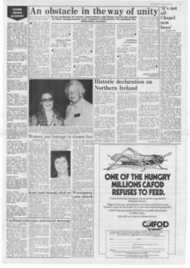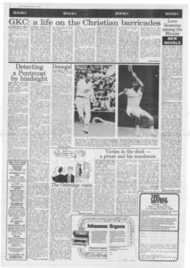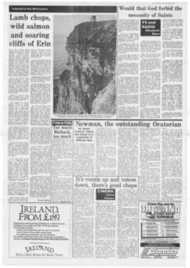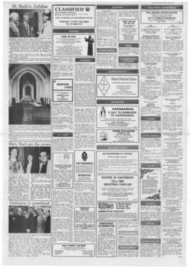Page 2, 4th July 1986
Page 2

Report an error
Noticed an error on this page?If you've noticed an error in this article please click here to report it.
Tags
Share
Related articles
Gary Maceoin Our Americas Correspondent, Reports On The...
Fighting For Free Elections
Change A Threat Or A Challenge?
Jesuit Anger At Us
Kissinger ' S Myopic
The thick end of the US wedge
Letter from
AMERICA
by Gary MacEoin
EXILED Central American opposition leaders, for whom Mexico City is a major rallying point, are amazed at the role the United States embassy in San Salvador is apparently playing in an effort to discredit both Archbishop Rivera y Damas and Salvadoran human rights organisations (Catholic Herald, June 27). They are even asking if this is not a step towards replacing President Duarte with banker Abraham Rodriguez as one more willing to support the military victory policy of Washington and the Salvadoran armed forces.
A central element in the intrigue was a press conference on May 30 at the San Salvador headquarters of .the Treasury police, perhaps the most infamous of all Salvadoran security forces, by Luz Janeth Alfaro Pena (or Michel Salinas), who said she had been detained ten days earlier. It is widely thought she had long been a secret agent of the police and was simply continuing her collaboration with them. Alternatively, she may have been subjected to torture, or her sister may have been tortured in her presence in order to break her.
In any case, she had worked since 1982 in the nongovernmental Human Rights Commission, and she asserted that since 1983 she had used this work as a cover for a role in the National Resistance, one of the many organisations that constitute the National Democratic Front, the coalition of opposition parties and movements which is the political arm of the guerrilla movement.
The entire Commission, she claimed, is made up of members of these various organisations, and it serves to provide to world opinion distorted reports on the human rights situation in El Salvador. Even the Committee of Mothers of the Disappeared is thrown in as part of this "conspiracy" of distortion.
The most sensational part of the statement dealt with the sources of funding of the Commission. For the past year, she said, it had been sustained by Bread for the World, an agency of West German churches, which transmitted its funds through the Social Secretariat of the Archdiocese. International aid for internally displaced refugees, she added, comes by the same channel, but "ninety-five percent of it goes to the different frentes (politicomilitary organisations) and 5 per cent really goes to the refugees."
Under questioning from the international press, Michel Salinas claimed that top church officials in San Salvador were implicated in the diversion of aid from refugees to the guerrilla organisations. She listed Fr Octavio Cruz, head of the Social Secretariat, Maria Julia Hernandez, head of refugee assistance, and Laura Guzman. They present projects "for millions of dollars", she said, but this money doesn't go to the refugees who are "in places where a human being cannot live."
Nor did the Archbishop escape. After much prodding, she asserted that Rivera y Damas "knew perfectly well" what was happening, that he knew that the humanitarian organisations were manipulated by the guerrillas. "Yes", she answered, when asked if that meant that the Church is helping maintain an armed war against the government.
There seems to be a clear connection between Michel Salinas's "capture" and the seizure in subsequent days of seven members of the Commission of Human Rights and three members of the Committee of Mothers of the Disappeared. One of them, a widow, Maria Teresa Tula de Canales, had been seized by unknown men on May 6, raped and tortured under interrogation for two days.
An indication of the level of US intervention in the internal affairs of El Salvador is provided by the US embassy's interpretation of the events just described. Its version stated that the members of the Committee and of the Commission had been "legally detained", that these organisations are "suspected" of harbouring members of the guerrilla alliance and spreading disinformation on human rights questions.
Evidence available to the government, it said, provided probable cause for the arrest, and normal procedures were followed. It did not detail the kinds of torture involved in the "normal procedures" of the Hacienda police. Instead, it added that "we have long believed" that these organisations have been influenced and manipulated by the FMLN.
The Reagan Administration's growing difficulty in persuading the Congress and the American public that the Salvadoran military is improving its human rights record is sufficient explanation for its anxiety to publicise the claimed defection of Michel Salinas.
But the grave accusations against the Archbishop, personal friend of President Duarte, represent a major policy switch. Having scuttled to the best of its ability the Contadora peace plans, Washington seems committed to prevent any further substantive discussions between Duarte and the popular forces.
blog comments powered by Disqus











